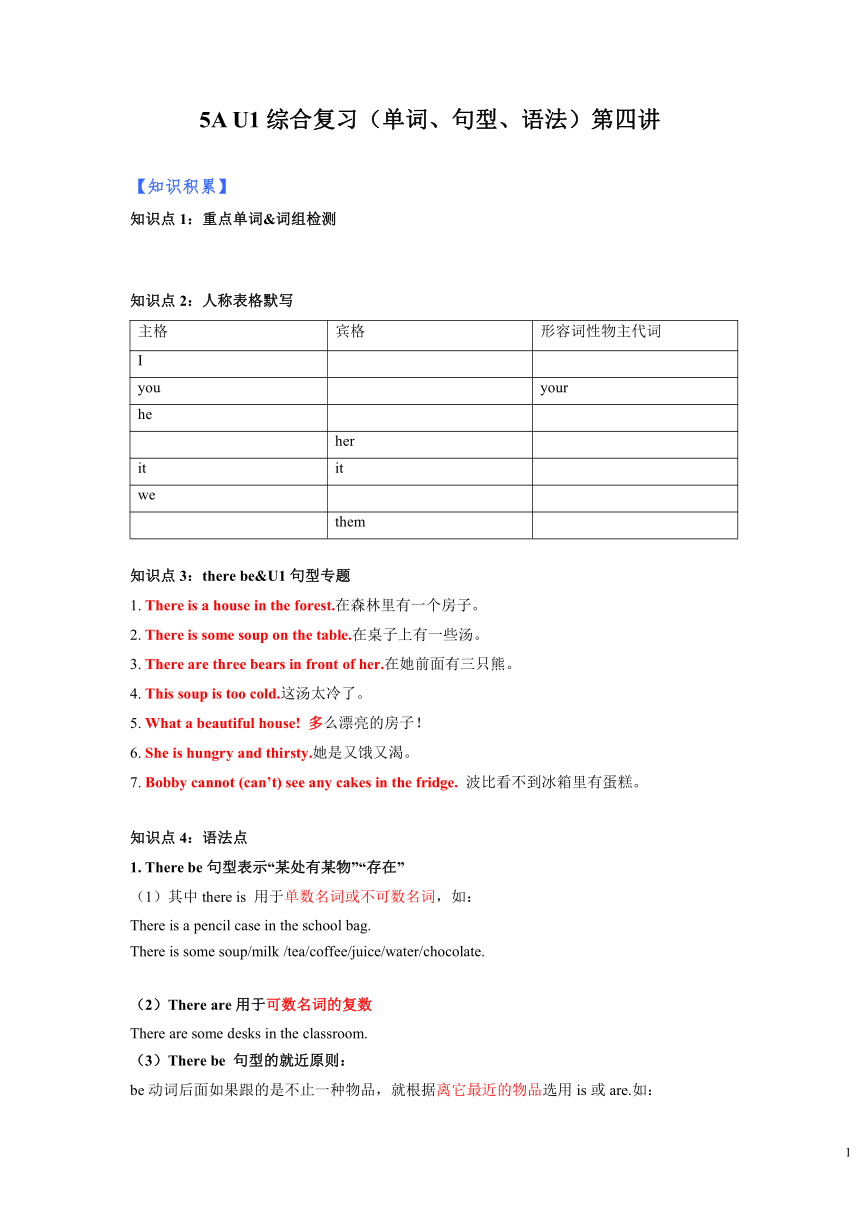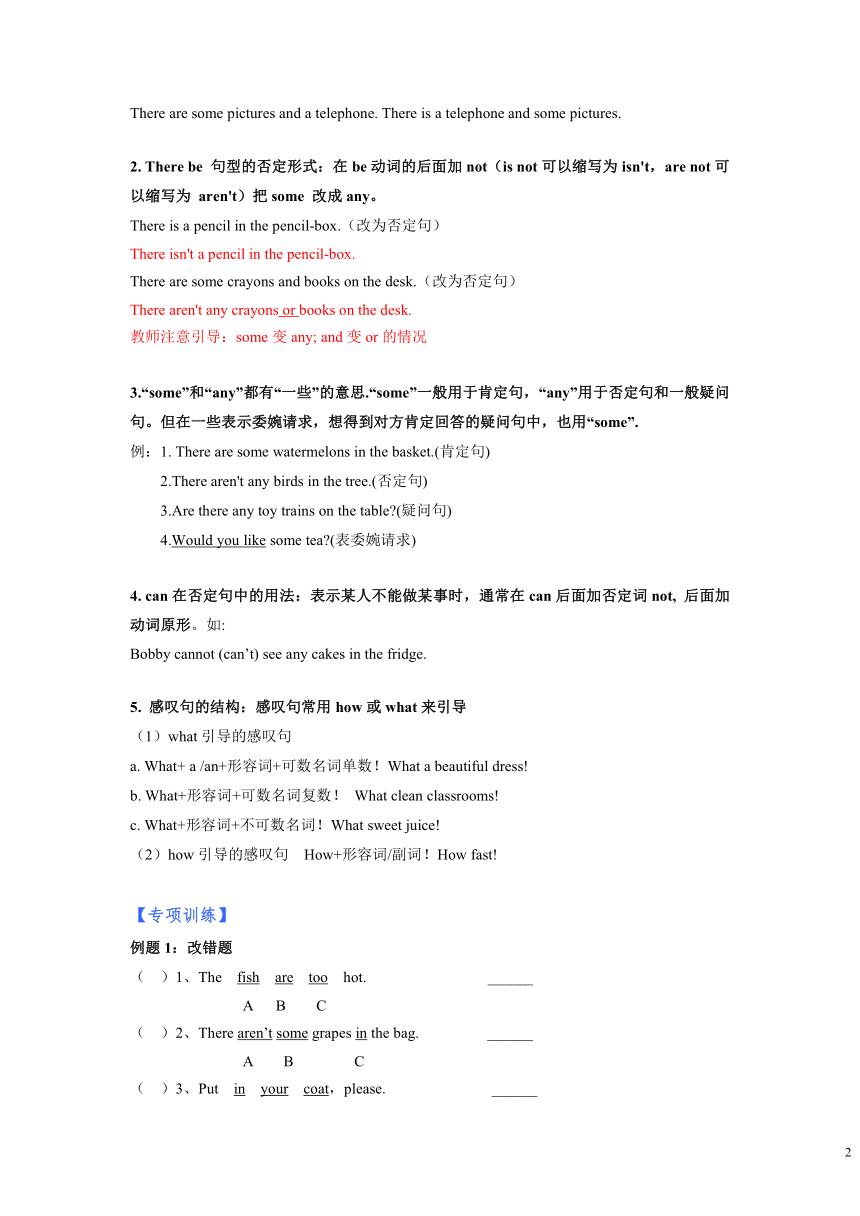Unit 1 Goldilocks and the three bears 综合复习(单词、句型、语法)第四讲小卷 (无答案)
文档属性
| 名称 | Unit 1 Goldilocks and the three bears 综合复习(单词、句型、语法)第四讲小卷 (无答案) |

|
|
| 格式 | zip | ||
| 文件大小 | 95.5KB | ||
| 资源类型 | 教案 | ||
| 版本资源 | 牛津译林版 | ||
| 科目 | 英语 | ||
| 更新时间 | 2021-12-07 00:00:00 | ||
图片预览


文档简介
5A U1综合复习(单词、句型、语法)第四讲
【知识积累】
知识点1:重点单词&词组检测
知识点2:人称表格默写
主格 宾格 形容词性物主代词
I
you your
he
her
it it
we
them
知识点3:there be&U1句型专题
1. There is a house in the forest.在森林里有一个房子。
2. There is some soup on the table.在桌子上有一些汤。
3. There are three bears in front of her.在她前面有三只熊。
4. This soup is too cold.这汤太冷了。
5. What a beautiful house! 多么漂亮的房子!
6. She is hungry and thirsty.她是又饿又渴。
7. Bobby cannot (can’t) see any cakes in the fridge. 波比看不到冰箱里有蛋糕。
知识点4:语法点
1. There be句型表示“某处有某物”“存在”
(1)其中there is 用于单数名词或不可数名词,如:
There is a pencil case in the school bag.
There is some soup/milk /tea/coffee/juice/water/chocolate.
(2)There are用于可数名词的复数
There are some desks in the classroom.
There be 句型的就近原则:
be动词后面如果跟的是不止一种物品,就根据离它最近的物品选用is或are.如:
There are some pictures and a telephone. There is a telephone and some pictures.
2. There be 句型的否定形式:在be动词的后面加not(is not可以缩写为isn't,are not可以缩写为 aren't)把some 改成any。
There is a pencil in the pencil-box.(改为否定句)
There isn't a pencil in the pencil-box.
There are some crayons and books on the desk.(改为否定句)
There aren't any crayons or books on the desk.
教师注意引导:some变any; and变or的情况
3.“some”和“any”都有“一些”的意思.“some”一般用于肯定句,“any”用于否定句和一般疑问句。但在一些表示委婉请求,想得到对方肯定回答的疑问句中,也用“some”.
例:1. There are some watermelons in the basket.(肯定句)
2.There aren't any birds in the tree.(否定句)
3.Are there any toy trains on the table (疑问句)
4.Would you like some tea (表委婉请求)
4. can在否定句中的用法:表示某人不能做某事时,通常在can后面加否定词not, 后面加动词原形。如:
Bobby cannot (can’t) see any cakes in the fridge.
5. 感叹句的结构:感叹句常用how或what来引导
(1)what引导的感叹句
a. What+ a /an+形容词+可数名词单数!What a beautiful dress!
b. What+形容词+可数名词复数! What clean classrooms!
c. What+形容词+不可数名词!What sweet juice!
(2)how引导的感叹句 How+形容词/副词!How fast!
【专项训练】
例题1:改错题
( )1、The fish are too hot. ______
A B C
( )2、There aren’t some grapes in the bag. ______
A B C
( )3、Put in your coat,please. ______
A B C
( )4、The teacher comes and say “hello”. ______
A B C
( )5、Helen and Tim finds their cats. ______
A B C
例题2:单选-介词
( )1.___ the afternoon of May, we visited the old man.
A. On B. At C. In
( )2.Many people work ___ the day and sleep ___ night.
A. on ; at B. in ; in C. in ; at
( )3.He speaks Japanese best ____ the boy students.
A. between B. with C. among
( )4.He left home ____ a cold winter evening.
A. at B. on C. in
( )5.Shanghai is ____ the east of China.
A. in B. on C. to
例题3:根据句意及首字母或中文提示写出单词
1. There are some ________(书) in my schoolbag. I like reading.
2. I can see two ________(熊) in the zoo.
3. My schoolbag is ________(在…之间) the two desks.
4. The monkey live in the big ________(森林).
5. There is a ________(房子) beside the cinema.
6. – I’m hungry.
--You can h______ a piece of bread.(吃)
7. Today is my birthday. I’m very h________(高兴).
8. It is ______ hot now.(非常)
9. There is s________ milk in the glass.(一些)
10. The big tree is in f________ of our school.(在..前面)
例题4:感叹句
1:______ a beautiful girl she is! ( What/How )
2:______ kind teachers they are! ( What/How )
3:______ hot water it is! ( What/How )
4:______ happy I am! ( What/How )
5:________ fast the boy is running! ( What/How )
练习:用What或How填空:
1. ____ a big tree it is!
2. ______ big the tree is!
3. ____ beautiful pictures!
4. ____ beautiful the pictures are!
5. ____ high the building is!
6. ____ big eyes she has!
7. ____ lovely the ice-cream is!
8. ____ lovely ice-cream!
例题5:阅读
Helen hasn’t been in England long and every thing is new to her. She often compares life(比较生活) in London with life in Vienna(维亚纳).Some things are not so nice. The shops are bigger in London than in Vienna and there are more kinds of things in the shops. But it’s more expensive(贵)to have lunch or a dinner at a restaurant or go to a theater in London.
1. London is in __________.
A. Vienna B. England C. London
2. The shops in Vienna are _________.
A. bigger B. smaller C. nicer
3. There are more kinds of things in the shops in ____than in____.
A. London…Vienna B. Vienna…London C. Vienna…England
4. It’s ______to go to see a film in Vienna than in London.
A. more expensive B. not cheaper C. cheaper
5. If we are hungry, we can go to a _____to buy lunch or dinner and eat there.
A. theater B. restaurant C. shop
【要点回顾】
重难点1:U1单元测试
重难点2:人称用法
重难点3:介词梳理,词性认识
【品格养成】
Can you tell me a story
批注:
引导学生开口说,组织语言,说作文。
介词小卡片
1)at 用在具体的时刻和中午前面
如:at 6:00, at seven thirty, at noon
2)on用在具体星期、日期前面。
如:on Monday, on September 1st
3)in 用在年、月、季节或早上、下午、晚上的前面。
如:in 2008, in February, in spring, in the morning
【知识积累】
知识点1:重点单词&词组检测
知识点2:人称表格默写
主格 宾格 形容词性物主代词
I
you your
he
her
it it
we
them
知识点3:there be&U1句型专题
1. There is a house in the forest.在森林里有一个房子。
2. There is some soup on the table.在桌子上有一些汤。
3. There are three bears in front of her.在她前面有三只熊。
4. This soup is too cold.这汤太冷了。
5. What a beautiful house! 多么漂亮的房子!
6. She is hungry and thirsty.她是又饿又渴。
7. Bobby cannot (can’t) see any cakes in the fridge. 波比看不到冰箱里有蛋糕。
知识点4:语法点
1. There be句型表示“某处有某物”“存在”
(1)其中there is 用于单数名词或不可数名词,如:
There is a pencil case in the school bag.
There is some soup/milk /tea/coffee/juice/water/chocolate.
(2)There are用于可数名词的复数
There are some desks in the classroom.
There be 句型的就近原则:
be动词后面如果跟的是不止一种物品,就根据离它最近的物品选用is或are.如:
There are some pictures and a telephone. There is a telephone and some pictures.
2. There be 句型的否定形式:在be动词的后面加not(is not可以缩写为isn't,are not可以缩写为 aren't)把some 改成any。
There is a pencil in the pencil-box.(改为否定句)
There isn't a pencil in the pencil-box.
There are some crayons and books on the desk.(改为否定句)
There aren't any crayons or books on the desk.
教师注意引导:some变any; and变or的情况
3.“some”和“any”都有“一些”的意思.“some”一般用于肯定句,“any”用于否定句和一般疑问句。但在一些表示委婉请求,想得到对方肯定回答的疑问句中,也用“some”.
例:1. There are some watermelons in the basket.(肯定句)
2.There aren't any birds in the tree.(否定句)
3.Are there any toy trains on the table (疑问句)
4.Would you like some tea (表委婉请求)
4. can在否定句中的用法:表示某人不能做某事时,通常在can后面加否定词not, 后面加动词原形。如:
Bobby cannot (can’t) see any cakes in the fridge.
5. 感叹句的结构:感叹句常用how或what来引导
(1)what引导的感叹句
a. What+ a /an+形容词+可数名词单数!What a beautiful dress!
b. What+形容词+可数名词复数! What clean classrooms!
c. What+形容词+不可数名词!What sweet juice!
(2)how引导的感叹句 How+形容词/副词!How fast!
【专项训练】
例题1:改错题
( )1、The fish are too hot. ______
A B C
( )2、There aren’t some grapes in the bag. ______
A B C
( )3、Put in your coat,please. ______
A B C
( )4、The teacher comes and say “hello”. ______
A B C
( )5、Helen and Tim finds their cats. ______
A B C
例题2:单选-介词
( )1.___ the afternoon of May, we visited the old man.
A. On B. At C. In
( )2.Many people work ___ the day and sleep ___ night.
A. on ; at B. in ; in C. in ; at
( )3.He speaks Japanese best ____ the boy students.
A. between B. with C. among
( )4.He left home ____ a cold winter evening.
A. at B. on C. in
( )5.Shanghai is ____ the east of China.
A. in B. on C. to
例题3:根据句意及首字母或中文提示写出单词
1. There are some ________(书) in my schoolbag. I like reading.
2. I can see two ________(熊) in the zoo.
3. My schoolbag is ________(在…之间) the two desks.
4. The monkey live in the big ________(森林).
5. There is a ________(房子) beside the cinema.
6. – I’m hungry.
--You can h______ a piece of bread.(吃)
7. Today is my birthday. I’m very h________(高兴).
8. It is ______ hot now.(非常)
9. There is s________ milk in the glass.(一些)
10. The big tree is in f________ of our school.(在..前面)
例题4:感叹句
1:______ a beautiful girl she is! ( What/How )
2:______ kind teachers they are! ( What/How )
3:______ hot water it is! ( What/How )
4:______ happy I am! ( What/How )
5:________ fast the boy is running! ( What/How )
练习:用What或How填空:
1. ____ a big tree it is!
2. ______ big the tree is!
3. ____ beautiful pictures!
4. ____ beautiful the pictures are!
5. ____ high the building is!
6. ____ big eyes she has!
7. ____ lovely the ice-cream is!
8. ____ lovely ice-cream!
例题5:阅读
Helen hasn’t been in England long and every thing is new to her. She often compares life(比较生活) in London with life in Vienna(维亚纳).Some things are not so nice. The shops are bigger in London than in Vienna and there are more kinds of things in the shops. But it’s more expensive(贵)to have lunch or a dinner at a restaurant or go to a theater in London.
1. London is in __________.
A. Vienna B. England C. London
2. The shops in Vienna are _________.
A. bigger B. smaller C. nicer
3. There are more kinds of things in the shops in ____than in____.
A. London…Vienna B. Vienna…London C. Vienna…England
4. It’s ______to go to see a film in Vienna than in London.
A. more expensive B. not cheaper C. cheaper
5. If we are hungry, we can go to a _____to buy lunch or dinner and eat there.
A. theater B. restaurant C. shop
【要点回顾】
重难点1:U1单元测试
重难点2:人称用法
重难点3:介词梳理,词性认识
【品格养成】
Can you tell me a story
批注:
引导学生开口说,组织语言,说作文。
介词小卡片
1)at 用在具体的时刻和中午前面
如:at 6:00, at seven thirty, at noon
2)on用在具体星期、日期前面。
如:on Monday, on September 1st
3)in 用在年、月、季节或早上、下午、晚上的前面。
如:in 2008, in February, in spring, in the morning
